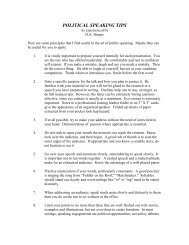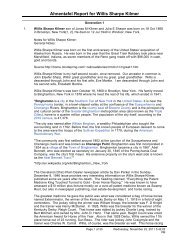My Descending from Gov. - D. A. Sharpe
My Descending from Gov. - D. A. Sharpe
My Descending from Gov. - D. A. Sharpe
You also want an ePaper? Increase the reach of your titles
YUMPU automatically turns print PDFs into web optimized ePapers that Google loves.
Register Report for William Bradford<br />
Generation 8<br />
"In 1877, McClellan was nominated by the Democrats for <strong>Gov</strong>ernor of NewJersey, an action<br />
that took him by surprise because he had notexpressed an interest in the position. He was<br />
elected and served asingle term <strong>from</strong> 1878 to 1881, a tenure marked by<br />
careful,conservative executive management and minimal political rancor. Theconcluding<br />
chapter of his political career was his strong support in1884 for the election of Grover<br />
Cleveland. He hoped to be namedsecretary of war in Cleveland's cabinet, a position for<br />
which he waswell suited, but political rivals <strong>from</strong> New Jersey were able to blockhis<br />
nomination.<br />
"McClellan's final years were devoted to traveling and writing. Hejustified his military career in<br />
McClellan?s Own Story, publishedposthumously in 1887. He died unexpectedly at age 58<br />
at Orange, NewJersey, after having suffered <strong>from</strong> chest pains for a few weeks. Hisfinal<br />
words, at 3 A.M., October 29, 1885, were, 'I feel easy now.Thank you.' He is buried at<br />
Riverview Cemetery in Trenton.<br />
"McClellan's son, George B. McClellan, Jr. (1865 ? 1940), was born inDresden, Germany,<br />
during the family's first trip to Europe. Knownwithin the family as Max, he was also a<br />
politician, serving as aUnited States Representative <strong>from</strong> New York State and as Mayor of<br />
NewYork City <strong>from</strong> 1904 to 1909. McClellan's daughter, Mary ('May') (1861? 1945), married<br />
a French diplomat and spent much of her life abroad.His wife Ellen died in Nice, France,<br />
while visiting May at 'VillaAntietam.' Neither Max nor May gave the McClellans any<br />
grandchildren.<br />
"The New York Evening Post commented in McClellan's obituary,'Probably no soldier who<br />
did so little fighting has ever had hisqualities as a commander so minutely, and we may add,<br />
so fiercelydiscussed This fierce discussion has continued for over a century.McClellan is<br />
usually ranked in the lowest tier of Civil War generals.However, the debate over McClellan's<br />
ability and talents remains thesubject of much controversy among Civil War and military<br />
historians.He has been universally praised for his organizational abilities andfor his very<br />
good relations with his troops. They referred to himaffectionately as 'Little Mac'; others<br />
sometimes called him the 'YoungNapoleon.' It has been suggested that his reluctance to<br />
enter battlewas caused in part by an intense desire to avoid spilling the blood ofhis men.<br />
Ironically, this led to failing to take the initiativeagainst the enemy and therefore passing up<br />
good opportunities fordecisive victories, which could have ended the war early, and<br />
therebycould have spared thousands of soldiers who died in those subsequentbattles.<br />
Generals who proved successful in the war, such as Lee andGrant, tended to be more<br />
aggressive and more willing to risk a majorbattle even when all preparations were not<br />
perfect. McClellan himselfsummed up his cautious nature in a draft of his memoirs: 'It<br />
hasalways been my opinion that the true course in conducting militaryoperations, is to make<br />
no movement until the preparations are ascomplete as circumstances permit, & never to<br />
fight a battle withoutsome definite object worth the probable loss.'<br />
"McClellan's reluctance to press his enemy aggressively was probablynot a matter of<br />
personal courage, which he demonstrated well enough byhis bravery under fire in the<br />
Mexican-American War. Stephen Searswrote, 'There is indeed ample evidence that the<br />
terrible stresses ofcommanding men in battle, especially the beloved men of his<br />
belovedArmy of the Potomac, left his moral courage in tatters. Under thepressure of his<br />
ultimate soldier's responsibility, the will to commanddeserted him. Glendale and Malvern Hill<br />
found him at the peak of hisanguish during the Seven Days, and he fled those fields to<br />
escape theresponsibility. At Antietam, where there was nowhere for him to fleeto, he fell into<br />
a paralysis of indecision. Seen <strong>from</strong> a longerperspective, General McClellan could be both<br />
comfortable andsuccessful performing as executive officer, and also, if somewhat<br />
lesssuccessfully, as grand strategist; as battlefield commander, however,he was simply in<br />
the wrong profession.'<br />
"One of the reasons that McClellan's reputation has suffered isbecause of his own memoirs.<br />
His original draft was completed in 1881,but the only copy was destroyed by fire. He began<br />
to write anotherdraft of what would be published posthumously, in 1887, as McClellan'sOwn<br />
Page 63 of 182 Tuesday, December 11, 2012 11:29:07<br />
AM














